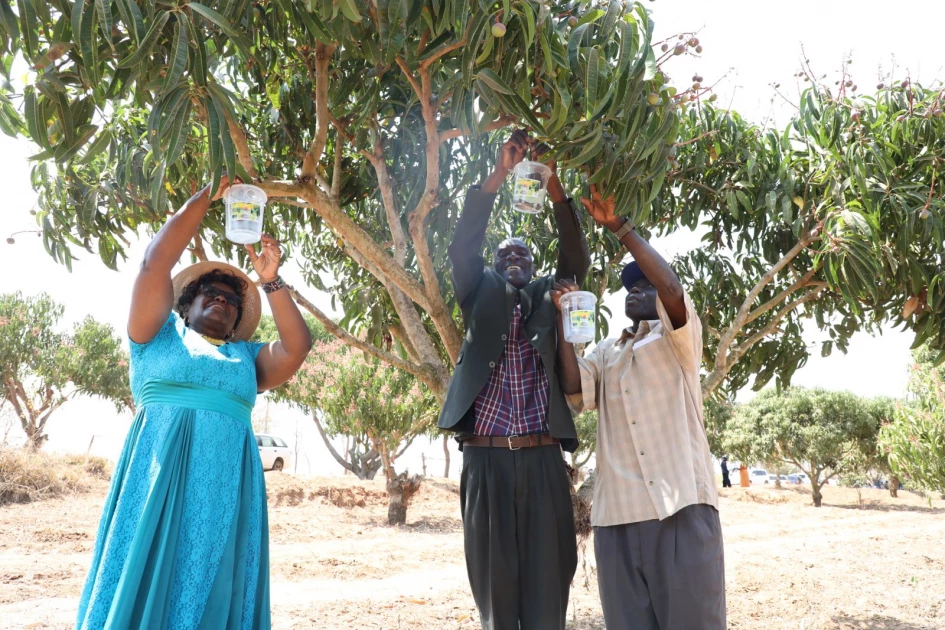From rotting mangoes to renewed hope: Makueni farmers find relief in fruit fly traps


Audio By Vocalize
In the mango orchards of Makueni, the sweet scent of ripening fruit once carried a bitter aftertaste of despair. For years, farmers watched helplessly as fruit flies invaded their trees, leaving behind black-spotted mangoes that no buyer wanted.
“It was very painful for us,” recalls Rose
Mulu, a small-scale farmer from Muvau/Kikumini Ward. “We sprayed so many
chemicals, but still the fruits rotted. We would spend money only to end up
with spoiled mangoes.”
For Rose and many like her, every fruit fly
infestation meant not just wasted fruit, but crushed dreams — of school fees
unpaid, hospital bills piling up, and empty markets. Yet today, a simple
invention is bringing relief and restoring hope: pheromone fruit fly traps.
“When we started using the traps,
everything changed,” Rose says with a smile. “We use fewer chemicals, the
mangoes look cleaner, and my income has gone up by almost 50 percent.”
Each trap, costing just KSh250, is baited
to lure male fruit flies, stopping them from breeding and breaking the cycle of
infestation. Four traps per acre are enough. For farmers who once poured money
into pesticides with little success, the solution feels nothing short of
revolutionary.
For Jackson Mutinda, a young farmer with big dreams, the traps mean more than saving mangoes. They mean freedom to diversify.
“Farming has been a great help,” he says. “With fewer losses, I’ve
been able to keep goats and try out other crops. If you are young and want to
make money, you must be strong. Farming is one way.”
Across Makueni, stories like Jackson’s and
Rose’s are spreading. Farmers speak with renewed energy about their orchards,
hopeful again that mangoes from this county will not just fill local markets
but also reach supermarket shelves abroad.
“I can dream again,” says Gibson Wambua,
who grows mangoes and oranges. “We’ve been trained to use organic fertilisers
and these traps. Now our harvest is better, and we can imagine bigger markets
for our fruit.”
The project, spearheaded by Trademark
Africa with support from the European Union, has distributed 15,000 traps to
mango growers in Makueni.
The program is also training farmers on
international standards, linking them to exporters, and investing in hot water
treatment facilities at Jomo Kenyatta International Airport
“Makueni produces 245,000 metric tonnes of
mangoes annually, yet farmers lose nearly half of that to pests. By reducing
these losses and improving quality, farmers can boost their incomes and revive
access to the lucrative EU market, which has been closed to Kenyan mangoes
since 2003,” says Liliane Mwai-Degwa, Trademark Africa’s country director
Agronomists say the impact is dramatic. “If
installed properly, the traps ensure about 90 percent of fruits meet export
quality,” explains Simon Kiio Kyuli of VAT Limited. “Unlike spraying, they
don’t leave harmful chemical residues, which have hurt Kenya’s reputation
abroad.”
Beyond the policies and trade deals,
however, it is the smallholder farmers who feel the change most deeply. “We
used to lose hope,” says Rose. “Now, when I look at my orchard, I see healthy
fruits and I know I can sell them. That means I can take care of my family.”
As Makueni becomes the first county to
adopt an agroecology policy, experts say it signals a new future for farming —
one that is safer, more sustainable, and farmer-driven.
“We are reducing pests without poisoning
our environment,” says Dr. Nehemiah Mihindo of the Effective IPM Association.
“This is the future of farming.”
And for the farmers of Makueni, that future
feels closer than ever. Every trap hung on a tree is more than just a tool. It
is a symbol of resilience, of lessons learned the hard way, and of a community
daring to believe once again in the promise of their mangoes.


Leave a Comment